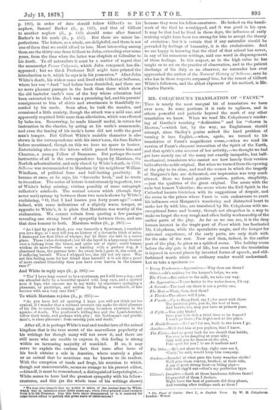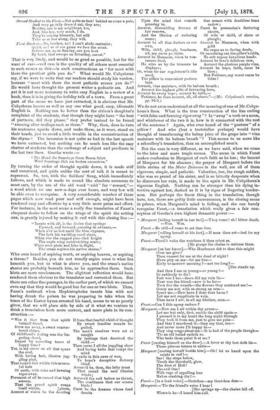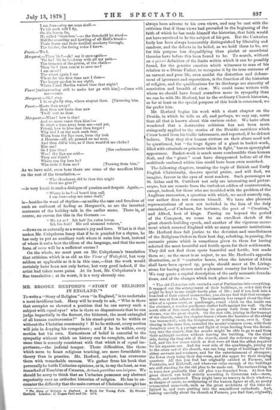MR. COLQUHOUN'S TRANSLATION OF " FAUST." Tills is nearly the
most unequal bit of translation we have ever seen. In some portions it is rude to ugliness, and in others powerful and pathetic beyond the mark of any other translation we know. When we read Mr. Colquhoun's render- ing of Goethe's touching "dedication" and his "chorus in Ileaven,"—which last, by the way, no Englishman should attempt, since Shelley's genius solved the hard problem of turning it into English,—when, again, we turned to his translation of Faust's magnificent curse,—when we read his version of Faust's eloquent invocation of the Spirit of the Earth, and that spirit's own account of her activity,—we thought we had got here merely one of the many not exactly incapable, but half- mechanical, translators who cannot see how lamely their version halts after the noble original. But when we turned from the opening of the play to its close, and read the scenes in which the tragedy of Margaret's fate are delineated, our impression was very much altered. Here we found genuine passion, pathos, simplicity, —just the qualities of the great original. The scene with the rude but honest Valentine, the scene where the Evil Spirit in the Cathedral haunts Gretchen with its suggestions of despair, and the scene in the prison where Faust in vain endeavours to exert his influence over Margaret's wandering and distracted heart to make her fly with him, are translated by Mr. Colquhoun with un- exceptional force and beauty, though not altogether in a way to make us forget the very rough and often faulty workmanship of the earlier parts of the play. As far as we can ace, it is the deep human interest in the tragic part of Faust which has fascinated Mr. Colquhoun, while the speculative magic, and the hunger for universal experience, of the early parts, are only dealt with for the sake of the rest. Now and then, indeed, in the earlier part of the play, he gives us a spirited scene. The holiday scene before the city gate is full of life, but even there the translation is injured in several places by inverted forms of speech, and old- fashioned words which no ordinary reader would understand. Let us take a specimen :- " Young 'Tradesmen—Apprentices.—Why then out there ? Others.—It's making for the keeper's lodge, wo aro. The First.—But rather to the mill, wo take our way. An Apprentice.—'T wore better to the water-house, I'd say. A Second.—The road out there is not a pretty ono.
The Rest. —What, then, dost thou? A Third.—The others will I join.
A Fourth.—Up to Burg-Dorf, say I ; for meat with there The prettiest girls, you do, the best of beer, And brawls, too, may you have at primost pace.
A Fifth.—You jolly blade! Does your hide itch a third time to ho frayed ? I won't go there ; I'm frightened at the place.
A Maid-Servant—No! no ! for me, back to the town I go. Another.—Woll find him at yon poplars, that I know.
The First.—And no great luck for me should that betide,
For ever is he dangling at your side ; Only with you ho dances on the plot,
Fine sport for you! to me it matters not!
The Other.—Ho's not alone to-day, right sure am I, 'Curly,' ho said, would keep him company.
Student—Zounde ! at what pace the lusty wenches stride I We'll give them convoy, brother, at their side, A jug of good strong beer—a biting pipe— Girl woll rigg'd out—that's my perfection type.
Citizen's Daughter.—Look at those handsome follows there l Disgraceful of them I declare.
Might have the best of partners did they please, And running after trollops such as those !
from it in his Gleanings. Can this have since disappeared, or is it reserved for • The Faust of Goethe: Part 1, in English Verse. By W. H. Colquhoun. Second Student to the First.—Not quite so fast! behind us come a pair,
And very prettily dressed out, they are; Besides, one is my neighbour, too, And, like her, very much, I do.
They're coming leisurely, but still Take us at last along, they will.
First Student.—No, brother, no! I can't abide restraint; Quick on ! or of our game we lose the scent. Believe me, upon Sunday, are you best By hand, that sweeps on Saturday, carest."
That is very lively, and would be as good as possible, but for the want of ease—and ease is the quality of all others most essential to such scenes as this—in such constructions as "for meet with there the prettiest girls you do." What would Mr. Colquhoun say, if we were to write that our readers should study his version, because "meet with there the most pathetic scenes you do ?" He would have thought the present writer a pedantic ass. And yet it is not more necessary to write easy English in a review of a book, than it is in giving the holiday talk of a town. From a great part of the scene we have just extracted, it is obvious that Mr. Colquhoun knows as well as any one what good, easy, idiomatic English is. Nothing can be better than the citizen's daughter's complaint of the students, that though they might have " the best of partners, did they please," they prefer instead to be found "running after trollops such as these." Why, then, does he turn his sentences upside down, and make them, as it were, stand on their heads, just to avoid a little trouble in the reconstruction of the rhyme ? The inversion is not quite so bad in the last speech we have extracted, but nothing can be much less like the easy chatter of students than the exchange of subject and predicate in the last two lines. Goethe wrote:— "Die Hand die Samstags ihren Boson fiihrt Wird Sonntags dich am besten caressiren."
By turning the order of thought upside down, it is made stiff and unnatural, and quite unlike the sort of talk it is meant to represent. So, too, with the Soldiers' Song, which immediately follows, and which is made to sound like absolute nonsense to most ears, by the use of the old word " sold" for " reward,"— a word which no one now-a-days ever hears, and very few will be able even to recognise. A very considerable number of these pages which now read poor and stiff enough, might have been rendered easy and effective by a very little more pains and effort. For instance, in the next scene a really fine translation of Faust's eloquent desire to follow on the wings of the spirit the setting sun, is greatly injured by making it end with this closing line :— " Innate with all, is the desire that springs Upward, and forward, pressing in advance,—
When o'er us lost amid the blue expanse, The lark his warbling carol sings, When o'er the rugged pine-clad height The eagle wing outstretching soars ; When over plain and lake in flight, The crane aspires his native shores."
Who ever heard of aspiring truth, or aspiring heaven, or aspiring a throne? Besides, you do not usually aspire even to what lies beneath you, but to what is above you, and the crane's native shores are probably beneath him, as he approaches them. Such blots are mere carelessness. The slightest reflection would have rendered them obvious to the translator and corrected them. But there are other fine passages, in the earlier part, of which we cannot even say that they would be good but for one or two blots. Thus, Faust's outbreak when Mephistopheles taunts him with not having drunk the poison he was preparing to take when the tones of the Easter hymn arrested his hand, seems to us so poorly given, that we will place side by side of it what we venture to think a translation both more correct, and more plain in its con- struction :— 4' Was it that from that spirit turmoil dread,
Drew me away, a sweet remem- bered chime, Of childhood's feeling was the lin- gering shred, Duped by according tones of happy time ?
Yet, is my curse on all that spans the soul,
With luring bait, illusive jug- gling play, That roots it fast within this mourn- ful hole Of earth, with false and fawning vigor s way.
Foremost of all be cursed that high esteem.
That the proud spirit wraps
itself within, [gleam, Accurst of vision be the dazzling
If from that fearful whirl of thought By sweet familiar sounds be- guiled, The man's resolves were set at naught
By feelings that deceived the child.— Then curse I all the juggling show And luring baits that tempt the mind To exile in this cave of woe,
To hope's deceptive flattery blind.
Accurs'd be, then, the lofty trust That round the soul illusion winds ; Accurs'd the veil before us thrust, The semblance that our senses binds !
Crust be the dreams whose fond deceits
Our names with deathless fame endow ; Curet be possession's flattering cheats, Of wife or child, of slave or plough; Accurst be Mammon, when with gold He urges us to daring deeds, Or smoothing out the pillow's folds, To soft repose luxurious heads. Accurst be love's delicious vow, Accurst the glorious purple vine, Accurst be hope, faith, curst be thou; But Patience, my worst curse be thine !
Accurst, vine moisture, with its balsam breath ; Accurst the highest gifts of favouring love,
Accurst be every hope ; accurst be faith,— Patience, be thou accurst, all, all above."—(ilir. Colguhoun's version, pp. 94-5)
We do not even understand at all the meaning of one of Mr. Colqu- houn's lines. What is the true construction of the line ending " with false and fawning vigor sway " ? Is "sway" a verb or a noun, and whichever of the two it is, how is it connected with the rest of the sentence ? Again, who ever heard of the " posture" of a pillow ? And who (but a teetotaller perhaps) would have thought of transforming the balmy juice of the grape into "vine moisture with its balsam breath "? This seems to us more like a schoolboy's translation, than an accomplished man's.
But the case is very different, as we have said, when we come to the later and more tragic scenes. The scene in which Faust makes confession to Margaret of such faith as he has ; the lament of Margaret for his absence ; the prayer of Margaret before the little shrine of the Mater Dolorosa in the wall, are all of them vigorous, simple, and pathetic. Valentine, too, the rough soldier, who was so proud of his sister, and is so bitterly desperate when he discovers her ruin, is made to live again in Mr. Colquhoun's vigorous English. Nothing can be stronger than his dying in- vective against her, dashed as it is by signs of lingering tender- ness. But perhaps the finest thing in the translation, though here, too, there are gritty little excrescences, is the closing scene in prison, when Margaret's mind is failing, and she can barely recognise Faust,—a translation which really gives a fair con- ception of Goethe's own highest dramatic power :— " Margaret [hiding herself in her bed].—They come! oh! bitter death.
—Woo. Woe.
Faust. —Be still—I come to set thee free.
Margaret [rolling herself at his feet].—If man thou art—feel for my
agony.
Faust.—Thoul't wake the watchers if thou criest so.
[He grasps the chains to unloose them.
Margaret [on her knees].—Who Headsman did to thee this might
Over me give ?
Thou comest for me at the dead of night !
Have pity on me—let me live—
Early to-morrow morning ?—not too long ? — [She stands up.
And then I am so young—so young !— So suddenly to die !
Fair was I too—there did my ruin lie— Near was the friend—now is he far—
Torn lies the wreath—the flowers they scattered are !-
Grasp me not, with so strong an arm—
Spare me.—How have I done thee harm ?
Let me not supplicate in vain.
Thee have I nor, in all my lifetime, seen.-
Faust.—Gan I this agony endure ?
Margaret.—Now am I all within thy power— Let me but only, first, suckle the child again—
I pressed it to my heart the long night through
They took it from me, just to give me pain— And that I murdered it—they say that, too— And never more I'll happy be— They sing songs about me.—It is bad of the people thongh-
'Tis an old ballad endeth so.
Who bade them point it at me ?
Faust [casting himself on the floor].—A lover at thy feet doth lie— These piteous fetters to untie— Margaret [casting herself beside him].—Oh! let us kneel upon the
saints to call !- See ! the steps below, 'Neath the threshold, glow, The fires of Hell!
The evil One!
With rage of appalling fear Makes crashing din!-
Faust.—{in a loud voice].—Gretchen—my Gretchen dear- Margaret.—'Tis the friend's voice I hear I
[She springs up—the chains fall off.
Where is he—I heard him call. Upon the mind that cometh pressing in.
Accurst, dissembling dreams of fair renown, And the illusion of enduring name ; Accurst be all that flatters as our own, Wife, child, plough, bondman, all, my curse ye claim.
Accurst be Mammon, when to ven- turous deed, He stirs us by the treasure he displays ; Or, when for our regalement's idle need, The pillow in convenient posture lays.
I am free—stop me none shall.—
To his neck will I fly, On his bosom lie, He called Gretchen'—on the threshold he stood— Mid the sounding and howling of all Hell's brood— Their fierce and their devilish mockery through, The tender, the loving voice I knew.
Faust.—'Tis L Margaret.—Thou 'tis?—oh! say it once again- 'Tis he ! 'tis be !—Away with all my pain— The torment of the prison, of the chain—
Thou ? thou com'st to save me?
I am saved !
Tho street again I see
Where for the first time saw I thee—
The happy garden in my sight, Where I and Martha waited thee that night!
Faust [endeavouring still to make her go with him].—Come with me—come.
Margaret.—Oh! stay.
I do so gladly stay, where stayest thou. [Caressing him.
Faust.—Haste thee away !
Dost thou not baste thee now 'Twill cost us dear.
Margaret.—What ! how is this! And no more canst thou kiss !- So short a time away from me—and yet, Friend, how to kiss dost thou forget ?
Why feel I on thy neck such fear, When from thy lips once, from thy look A Heaven—all, all, pressed on me near,
And then did'st kiss, as if thou would'st me choke?
Kiss me!
Or I kiss thee! [She embraces biro. Woe! thy lips are cold—
They aro dumb Where can thy love be?
Who stole it from me? [Turning from him."
As we have said, even here there are some of the needless blots on the rest of the translation,-
'• Who Headsman did to thee this might Over me give?"
—is very harsh in such a dialogue of passion and despair. Again,— "Where is be ?—I heard him call. 1 am free—atop me none shall," is—besides its want of rhythm—as unlike the ease and freedom of such an outburst of feeling as Margaret's, as are the inverted sentences of the holiday-talk in the earlier scene. There is, of
course, no excuse for this in the German :-
" Wo iit er? Ich hab' ihn rafen horen.
Ich bin frei ! Mir soil niemand wehron,"
—flows on as naturally as a woman's joy and love. What is it that makes Mr. Colquhoun fancy that if he is puzzled for a rhyme, he has only to put an auxiliary verb where it suits him best, instead of where it suits best the idiom of the language, and that the mere form of verse will be a sufficient excuse ?
On the whole, we must pass on Mr. Colquhoun's translation that criticism which is as old as the Vicar of Wakefield, but very seldom so applicable as it is in this case,—that the work would certainly have been not only better, but very good indeed, if the artist had taken more pains. At its best, Mr. Colquhoun's is a fine translation ; at its worst, it is a very slovenly one.




































 Previous page
Previous page